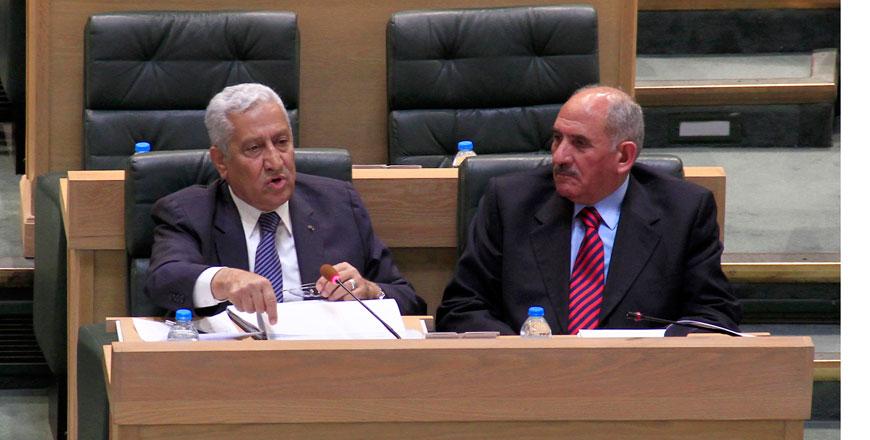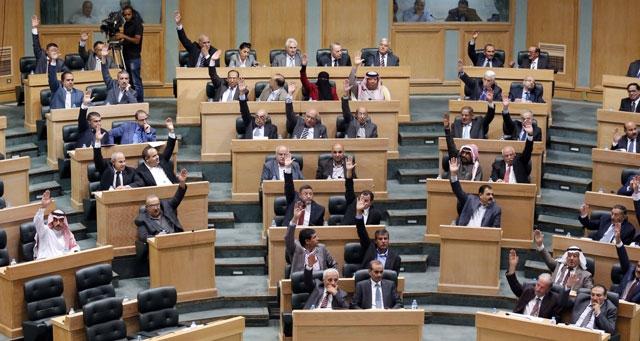You are here
Politicians rule out gov’t-Parliament friction after retirement law rejected
By Omar Obeidat - Sep 16,2014 - Last updated at Sep 16,2014
AMMAN — Politicians on Tuesday ruled out that His Majesty King Abdullah’s rejection of the draft law granting lawmakers lifetime pensions would stoke tension between the government and Parliament.
The current extraordinary session will end on September 30 before Parliament convenes for a new ordinary session in October.
In phone interviews with The Jordan Times, lawmakers and a senior official said MPs and senators realise that the King’s decision Monday to withhold ratification of the amended draft civil retirement law aimed to ensure the constitutionality of the controversial bill, which triggered wide public outcry.
Under the piece of legislation — approved during a joint Parliament session last week — MPs and senators granted themselves lifetime pensions equal to those of ministers, setting a seven-year service in Parliament or civil service as an eligibility condition. A minister’s monthly pension is JD3,000.
In his letter to Prime Minister Abdullah Ensour, the King said the draft law did not address imbalances in the system nor ensured justice.
The King said the debate triggered by the law suggests that there is suspicion over the constitutionality of the draft law, urging the government to refer it to the Constitutional Court and then carry out a thorough study that concludes with a “realistic solution” that ensures justice for all, taking into consideration the difficult economic situation and budgetary strains.
Jordanians have expressed resentment over the lawmakers’ move and accused parliamentarians of seeking personal gains.
Jurists who contributed to the public debate have questioned the constitutionality of the law, because, for example, lawmakers are not civil servants.
No tensions in MPs, government relations seen
Senator Musa Maaytah said he would not expect any tension to emerge between Parliament and the government as the King has the constitutional right to reject any law and lawmakers understand that.
“I have talked to several MPs and they all understand the King’s point of view,” Maaytah said, adding it is in the interest of everyone and the country to make sure that there are no constitutional doubts over the bill, which, he agreed, is unpopular.
MP Tareq Khouri said that referring the draft law to the Constitutional Court was the right decision, expecting the relationship between the government and legislature to remain as it is supposed to be.
Khouri claimed that heads of the upper and lower chambers had government guarantees that it would accept the outcome of the vote over the law, adding the King made his move due to the ensuing public anger.
The lawmaker, who opposed the bill, said he was shocked by the magnitude of public anger against members of the Lower House alone, saying that senators were also to blame for approving the controversial piece of legislation.
“Senators were to benefit more because the majority of them meet the seven-year eligibility condition,” he added.
Minister of Political and Parliamentary Affairs Khaled Kalaldeh agreed with Maaytah and Khouri as he also ruled out any tensions between lawmakers and policy makers.
“Both authorities are working for the interest of the country,” the minister said, adding that what happened was that the King did not approve of the amendments made by deputies and declined to ratify the law accordingly.
Government to blame
However, MP Khalil Atiyeh blamed the government for “the harm caused to the image of Lower House”, explaining that it was the government that drafted the bill, while only made a few amendments.
MPs suggested that their pensions be equal to that of ministers and the government should have proposed reducing the pensions of ministers because it had the jurisdiction to do so, Atiyeh said.
“The government put the country on a crossroad and harmed the image of the House,” he added, a charge that was rejected by Kalaldeh.
The government did its part, he said, adding that the questions raised later by experts on the constitutionality of the bill, in addition to the angry public reaction, led to rejecting it by the King.
Related Articles
AMMAN — The Lower House on Sunday referred the draft civil retirement law to its Legal Committee for review.In September 2014, His Majesty K
Several citizens across the Kingdom on Saturday said they were enraged by the lawmakers’ move to grant themselves lifetime pensions equal to that of ministers.
His Majesty King Abdullah on Monday rejected the draft civil retirement law endorsed by the Parliament last week, which was supposed to grant MPs and Senators lifetime pension benefits, the Royal Court announced on its Twitter account @RHCJO .













